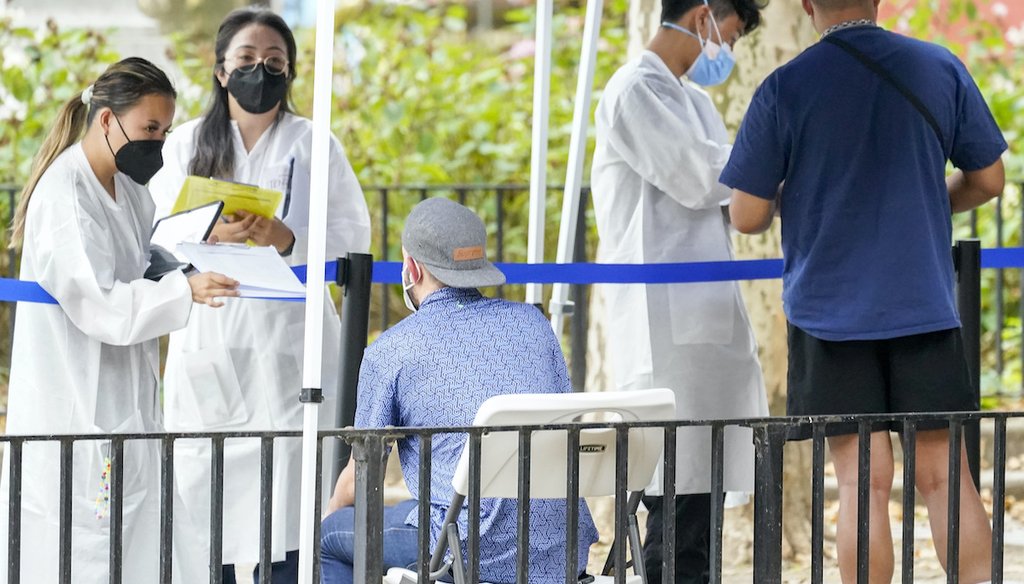Stand up for the facts!
Our only agenda is to publish the truth so you can be an informed participant in democracy.
We need your help.
I would like to contribute

Healthcare workers with New York City Department of Health and Mental Hygiene help people register for the monkeypox vaccine at one of the City's vaccination sites on July 26, 2022, in New York. (AP)
If Your Time is short
-
Experts said there’s no evidence that the virus behind the current monkeypox outbreak came from a lab in Wuhan, China.
-
Analysis of genetic material from the monkeypox virus indicates the current outbreak is linked to an outbreak in West Africa.
-
Researchers affiliated with the Wuhan Institute of Virology published a study involving the monkeypox virus in February 2022. That connection, reminiscent of claims about the virus that caused the COVID-19 pandemic, fueled baseless speculation about the origin of the monkeypox virus.
As countries that rarely see cases of monkeypox struggle to contain an ongoing outbreak, some social media users have promoted what feels like an oddly familiar theory: The monkeypox virus emerged from a lab in Wuhan, China.
Social media users such as comedian Jimmy Dore, who has spread health-related misinformation in the past, suggested such a connection.
"Woah. The NIH in the United States and the Wuhan viral institute were also working on monkeypox, and now there’s a monkeypox outbreak," Dore said in a video shared on Facebook. "What are the odds of that? I’m going to say 50-50. Whenever there’s a new outbreak now, 50-50 chance it was started in a Wuhan lab funded by Dr. Fauci and the NIH."
Dore’s co-host, comedian Kurt Metzger, responded: "I mean, not even a different virology lab accident? The same one?"
The post was flagged as part of Facebook’s efforts to combat false news and misinformation on its News Feed. (Read more about our partnership with Facebook.)
First, there is no evidence that the monkeypox outbreak that led the World Health Organization on July 23 to declare it a "public health emergency of international concern" has any link to a lab accident in China.
This misleading notion hearkens back to unproven theories about the COVID-19 pandemic. Since the early days of the pandemic, some have claimed that SARS-CoV-2, the coronavirus responsible for COVID-19, might have leaked from the Wuhan Institute of Virology. Although the exact origin of the virus behind COVID-19 is still unknown, a growing body of research suggests it emerged naturally from a Wuhan market. Some researchers are investigating the coronavirus lab-leak theory as a possibility.
The Wuhan Institute of Virology has been engaged in research related to monkeypox, but the suggestion that this work and the current monkeypox outbreak are tied has no basis in reality.
Experts told PolitiFact there’s no evidence that the virus that led to the current monkeypox outbreak came from a lab in Wuhan, China. Rather, they said the virus can be traced to an existing outbreak in West Africa.
Monkeypox is a zoonotic disease, meaning it is transmitted from animals to humans, said David Robertson, head of viral genomics and bioinformatics at the Medical Research Council-University of Glasgow’s Centre for Virus Research. The disease is caused by the monkeypox virus, also referred to as MPXV.
"The current international cases are all representing human-to-human transmission of MPXV and are linked to an ongoing West Africa outbreak," he said.
In May, scientists in Portugal wrote on the forum Virological that early analysis of the virus’s genetic material "indicates that the 2022 virus belongs to the West African clade." (A clade is a group of organisms descended from a common ancestor.) They also found that the virus responsible for the outbreak "is most closely related to viruses associated with the exportation of monkeypox virus from Nigeria to several countries in 2018 and 2019, namely the United Kingdom, Israel and Singapore."
Mark Slifka, a professor of molecular microbiology and immunology at Oregon Health and Science University’s School of Medicine, said that the virus has been sequenced and linked to the West African clade.
"Based on these genetics, it likely originated from this region of Africa," Slifka said. "There is no evidence to suggest that the virus circulating internationally escaped from any lab."
Robertson agreed: "There’s no evidence, none, that the MPXV variant causing the recents cases was generated in a lab."
In contrast, he said there is "strong evidence" the virus had been circulating in West Africa for years.
Connection to Wuhan lab fuels monkeypox lab leak claims
Monkeypox was indeed studied by Wuhan Institute of Virology researchers.
"Experiments on PCR testing of monkeypox viruses have taken place in Wuhan," reported Deutsche Welle, a German media outlet, in a fact-check. "This is undisputed." The story linked to a study that was first published online in February 2022.
The nine scientists who authored that study listed an affiliation with the Wuhan Institute of Virology, and four noted an additional affiliation with the University of the Chinese Academy of Sciences. The research focused on assembling a fragment of the monkeypox virus genome that could be used as a template for PCR testing, which the scientists described as "the gold standard" for the detection of viruses classified as orthopoxvirus, of which monkeypox is one.
Experts said laboratory work with the monkeypox virus is usually highly regulated, with strict protocols that minimize the risk of accidental infection.
Labs "pose an extremely low risk, in fact, for the emergence of new viruses," said Robertson of the Centre for Virus Research. "Nature, on the other hand, is a very high risk and a constant source of new viruses."
He said viruses have frequently emerged naturally and will continue to emerge naturally.
"With our highly interconnected world, we need to get much better at controlling local outbreaks before they become international events," Robertson said.
RELATED: Debating the origins of the COVID-19 virus: What we know, what we don’t know
RELATED: Monkeypox outbreak: What to know about its spread, symptoms and vaccines
Our Sources
Facebook post, July 20, 2022
Email interview with David Robertson, head of viral genomics and bioinformatics at the Medical Research Council-University of Glasgow Center for Virus Research, July 25, 2022
Email interview with Mark Slifka, a professor of molecular microbiology and immunology at Oregon Health and Science University’s school of medicine, July 25, 2022
Newsweek, "Theories linking monkeypox to Wuhan and Ukraine labs torn apart by experts," May 25, 2022
BBC, "Monkeypox wasn’t created in a lab - and other claims debunked," May 29, 2022
Deutsche Welle, "Fact check: Four fakes about monkeypox," July 6, 2022
Nature, "The COVID lab-leak hypothesis: what scientists do and don’t know," June 8, 2021
PHG Foundation, "Sequencing monkeypox," July 25, 2022
Virological, "First draft genome sequence of Monkeypox virus associated with the suspected multi-country outbreak, May 2022 (confirmed case in Portugal)," May 19, 2022
Virologica Sinica, "Efficient assembly of a large fragment of monkeypox virus genome as a qPCR template using dual-selection based transformation-associated recombination," June 17, 2022
World Health Organization, "Monkeypox," May 19, 2022
Science, "WHO chief declares monkeypox an international emergency after expert panel fails to reach consensus," July 23, 2022
Centers for Disease Control and Prevention, "2022 Monkeypox Outbreak Global Map," updated July 18, 2022
Nature, "The COVID lab-leak hypothesis: what scientists do and don’t know," June 8, 2021
National Library of Medicine, "Public health emergencies of international concern: a historic overview," Dec. 8, 2020
BBC, "Covid origin studies say evidence points to Wuhan market," July 26, 2022
The Independent, "New studies find more evidence of COVID’s origin from Wuhan’s ‘wet market,’" July 26, 2022
The New York Times, "New research points to Wuhan Market as pandemic origin," Feb. 27, 2022
The Washington Post, "Timeline: How the Wuhan lab-leak theory suddenly became credible," May 25, 2021
The Washington Post, "Scientists hone argument that coronavirus came from Wuhan market," July 27, 2022




























